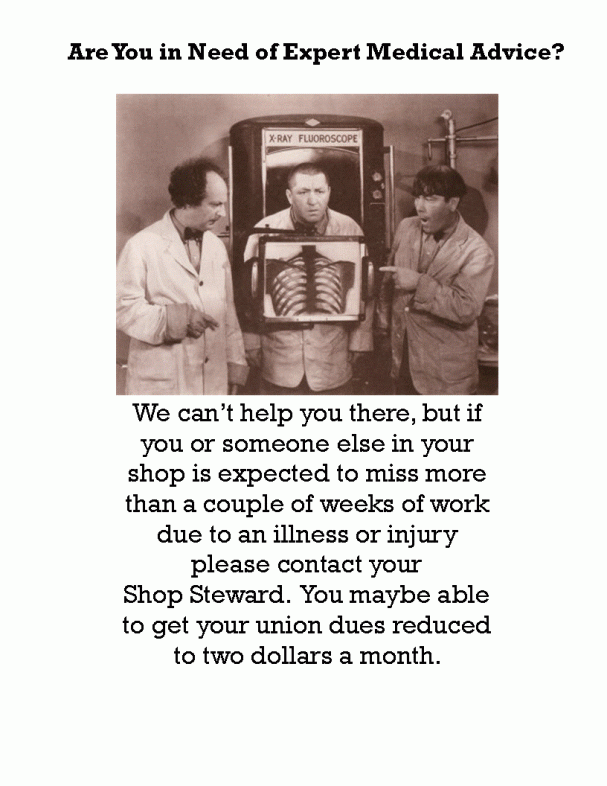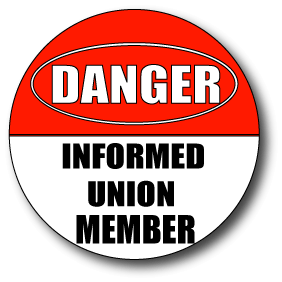
Monthly Archives: April 2016
Know Your Rights!
Before You Are Questioned
Know Your Rights!
Weingarten Rights
Your Right to Union Representation is one of the most important benefits of Union membership. You have a right to have a Union Representative present during investigatory interviews by supervisors and other managerial staff (including QA).
An investigatory interview occurs if:
1) Management questions you to obtain information and
2) You have a reasonable apprehension that your answers could be used as a basis for discipline or other adverse action.
You must ask for Union representation either at the beginning of or during the interview. Management does not have to remind you of this right. If your request is refused and management continues asking questions, you may refuse to answer. Your employer is guilty of an Unfair Labor Practice and charges may be filed.
I Request Union Representation. If you are called to a meeting with management remember the following: If my responses to your questions could lead to my being disciplined or terminated, or adversely affect my personal working conditions, I respectfully request that you summon my union representative. Until my representative arrives, I choose not to answer any questions.
Don’t sign your job away. If you are given anything to sign that you do not agree with, remember to print after your name: Signed Under Protest.
There are time limits to file a grievance after an incident that violates your rights under the Collective Bargaining Agreement. Talk to your Shop Steward as soon as possible.
I Want to File a Grievance!
 Hey I want to file a grievance!
Hey I want to file a grievance!
Shop Stewards hear this on almost a daily basis. As a union member the ability to grieve is one of our most important rights. But what is a grievance? Can I grieve this? What do I have to know before filing a grievance? are questions you might be asking yourself.
The first step is to read your contract. If you can’t find your copy you can find your contract online in the AndrewsIAM Library. Remember that there are time limits to filing a grievance, if you wait too long you may lose your rights. Next talk to your Shop Steward. If you do not know who your steward is you can check the Representatives Page. Remember in accordance with our Collective Bargaining Agreements only a Shop Steward or other approved Union Officer may present grievances to the company.
How do I know if I have grounds for a grievance? There are five common grounds for filing a grievance:
- 1. Does it Violate the Contract? Look at the union contract. While the meaning of a specific piece of contract language can be debated, you’re usually in a pretty good position to argue that a certain section or clause has been violated. Grievances based on a violation of the contract are often the easiest to win.
- Does It Violate Past Practice? Is what’s going on a violation of past practice? Even if something isn’t spelled out in the contract, if it’s been done that way for years, a change or crackdown may as well be a violation. Let’s say an employer has always given a little slack to workers who arrive late during bad weather. All of a sudden he starts docking people who arrive even five minutes late when a blizzard is roaring outside. In such a case, you’ve got a pretty good past practice grievance on your hands. If you’re going to cite past practice as the reason for your grievance, be sure the practice has existed for a substantial period of time.
- Does It Violate Employer Rules? Has there been a violation of your employer’s own rules and regulations? Uneven enforcement of the rules can provide the grounds for a grievance. For example, a worker caught smoking in a nonsmoking area can’t be fired if other people routinely do the same thing and are not disciplined.
- Does It Violate the Law? Your employer can’t violate the law. Even if your contract is silent on a specific issue, you still have the right to grieve if the employer does something illegal. Let’s say your contract doesn’t speak to health and safety issues, but your boss orders you to do something that’s clearly dangerous. You don’t have to cite con-tract language as the basis for your grievance, you can point instead to state or federal occupational safety and health legislation.
- Does It Violate Basic Rights? Finally, you can have legitimate grounds for a grievance if a worker’s basic rights are violated. If there’s been discrimination you may have something to grieve. Discrimination occurs when two people are treated differently under the same conditions, in a way in which one of them is harmed or treated unequally. While the most common types of discrimination tend to be based on race or sex, there are other ways as well, including age, physical appearance, personality and union activity, for that matter. Be aware that discrimination charges can be awfully hard to prove.
If you can base your case on contract language, you’ll find your case a lot easier to pursue.
Discipline Grievances: If you were disciplined you may have grounds for a grievance. The company is obligated to apply the standards of Just Cause when disciplining an employee. Even if you were “guilty” of the offence that the company has accused you of, you still may have grounds for a grievance. It is important that you talk to your Shop Steward.
Just Cause is part of our Collective Bargaining Agreements. It is the major difference between a union member and a non-union (at-will) employee.
Retaliation: The company cannot retaliate against a union member for filing a grievance or for supporting their union.
If you have any questions please contact your Shop Steward, they are there to help.
April Union Meeting


